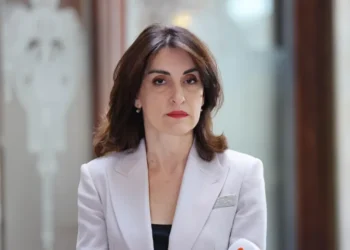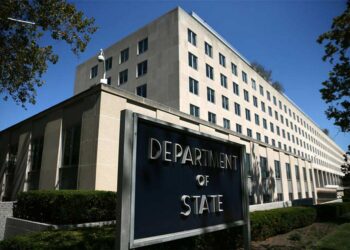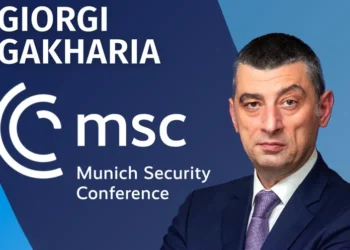China is increasingly viewed by NATO as a competitor, which represents a significant shift in the alliance’s vision. It fits the general narrative that NATO has recently been focused on Russia at a time when China was quietly increasing its cyber capabilities and military power around the world. This shift in priorities could propel NATO toward a more globalist vision that would draw it closer to the Indo-Pacific region.
NATO, arguably the most successful military alliance in history, is slowly but steadily edging toward casting China as an outright military competitor. Previously, the collective West avoided involving NATO in the context of the rising China, but NATO has been undergoing a profound evolution in which it is recalibrating its priorities, seeing us gradually moving toward a more global NATO with interests that spread beyond its classical zone (Europe) and into the Indo-Pacific region.
Many would argue that the foundation for a global NATO was established long ago. Indeed, for more than a decade, the alliance was operating in Afghanistan, where it led the International Security Assistance Force (ISAF), and NATO naval forces were among the first to fight off pirates via the OCEAN SHIELD operation along the east African coast in 2008.
Military training missions have been a common element of NATO involvement in the Middle East. The alliance also responds to terrorism, cyber-threats, and disinformation. Moreover, it enjoys special partnerships (consultative in nature) with Australia, New Zealand, South Korea, Japan, and Mongolia.
However, China’s military and economic rise, ambitious Belt and Road Initiative (BRI), and growing appetite in the Indian and Pacific oceans in the last decade have brought it into sharp opposition with the US. The US now sees NATO playing a bigger role in Eurasian affairs, which means taking a tougher stance toward Beijing through the development of a new vision for its outdated Euro-Atlantic-centric model.
The reasons for this shift are fundamental in nature. It has been argued that China’s official $260 billion defense budget could mask far greater purchasing power, potentially reaching up to 70% of the US defense budget. China’s military cooperation with Russia continues to grow and now covers Central Asia, the Mediterranean, the Persian Gulf, and even the Baltic Sea. Moreover, Beijing’s expanding supply of nuclear weapons can now reach Europe, which, in NATO’s mind, requires a rethinking of its approach to the Asian giant.
It can be argued that it is China that came to NATO and not the other way around. China could, indeed, serve as a driver for cohesion within the alliance, which over the past few years has seen internal strife among its member states. NATO was created to counter the Soviet Union on the European mainland, but it must now rise to the new “China reality.” It will have to change its geographical scope and methods of activities.
Though that shift in thinking is taking place within NATO, the alliance remains attached to its vision and wishes to avoid casting China as an outright military enemy, leaving open the possibility for cooperation.
China does not pose a direct military threat now, and that is unlikely to change any time soon. But there is an inescapable geopolitical dimension in which China becomes more active in the Arctic, the African continent, and the Indo-Pacific region. In addition, Beijing is negotiating a mammoth trade and economic cooperation treaty with Tehran that will give China the ability to position itself in the Persian Gulf and the Arabian Sea, a major artery for its oil supplies. All of this will require greater coordination and cohesion within NATO.
Critical changes to elements of NATO’s vision could be forthcoming. As China’s power grows, there will be a greater need for the establishment of a NATO-China Council, similar to what the alliance has had with Russia since 1997.
Perhaps deeper engagement with its Pacific partners, Australia, New Zealand, the Republic of Korea, Japan, and Mongolia, will become a necessity. Even a permanent military presence could be negotiated.
Some elements of this future strategy are already here. NATO chief Jens Stoltenberg raised the need for the alliance to take on a greater political role in world affairs and even to help nations of the Indo-Pacific compete with China’s rise.
“As we look to 2030, we need to work even more closely with like-minded countries like Australia, Japan, New Zealand, and [South] Korea to defend the global rules and institutions that have kept us safe for decades, to set norms and standards in space and cyberspace, on new technologies and global arms control,” Stoltenberg said.
We are witnessing a trend toward a more global NATO in which the alliance’s security agenda is no longer Europe- and North America-centric. This will take at least a decade. A shift in NATO’s vision will also mean that Moscow and its activities in Eurasia will be deemed to be at a lower level of threat.
NATO will have to move eastward. This does not necessarily mean stationing permanent military installations or personnel across Asia, but the alliance will have to pay more attention to Chinese activities. Doing so will draw it closer to Asia and the Indo-Pacific in particular.
Analysis by Emil Avdaliani
Emil Avdaliani is a professor at European University and the Director of Middle East Studies at Georgian think-tank, Geocase.














